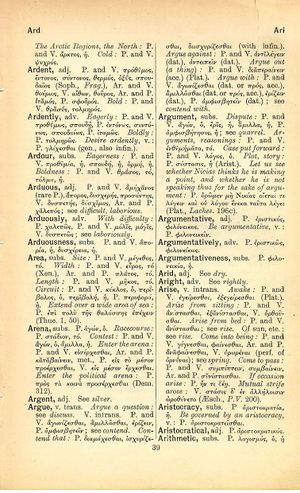argument: Difference between revisions
From LSJ
τὸ ἀγαθὸν αἱρετόν· τὸ δ' αἱρετὸν ἀρεστόν· τὸ δ' ἀρεστὸν ἐπαινετόν· τὸ δ' ἐπαινετὸν καλόν → what is good is chosen, what is chosen is approved, what is approved is admired, what is admired is beautiful
(CSV3) |
(nlel) |
||
| Line 11: | Line 11: | ||
<b class="b2">Let us see whether Nicias thinks he is making a point, and whether he is not speaking thus for the sake of argument</b>: P. ὁρῶμεν μὴ Νικιας οἴεταί τι [[λέγω|λέγειν]] καὶ οὐ λόγου [[ἕνεκα]] [[ταῦτα]] λέγει (Plat., <b class="b2">Laches.</b> 196C). | <b class="b2">Let us see whether Nicias thinks he is making a point, and whether he is not speaking thus for the sake of argument</b>: P. ὁρῶμεν μὴ Νικιας οἴεταί τι [[λέγω|λέγειν]] καὶ οὐ λόγου [[ἕνεκα]] [[ταῦτα]] λέγει (Plat., <b class="b2">Laches.</b> 196C). | ||
}} | |||
{{nlel | |||
|nleltext=[[πειθώ]], [[πίστις]] | |||
}} | }} | ||
Revision as of 17:10, 9 January 2019
English > Greek (Woodhouse)
subs.
Dispute: P. and V. ἀγών, ὁ, ἔρις, ἡ, ἅμιλλα, ἡ, P. ἀμφισβήτησις, ἡ; see quarrel.
Arguments, reasonings: P. and V. ἐνθυμήματα, τά.
Case put forward: P. and V. λόγος, ὁ.
Plot, story: P. σύστασις, ἡ (Arist.).
Let us see whether Nicias thinks he is making a point, and whether he is not speaking thus for the sake of argument: P. ὁρῶμεν μὴ Νικιας οἴεταί τι λέγειν καὶ οὐ λόγου ἕνεκα ταῦτα λέγει (Plat., Laches. 196C).

